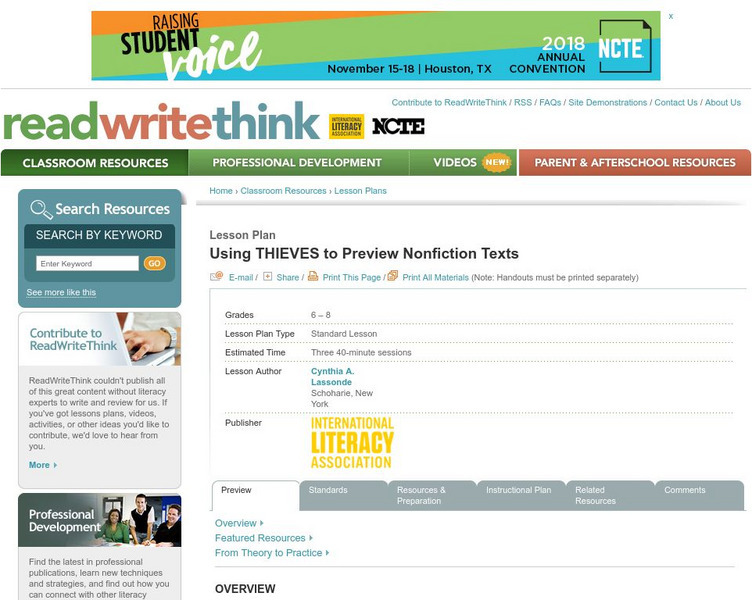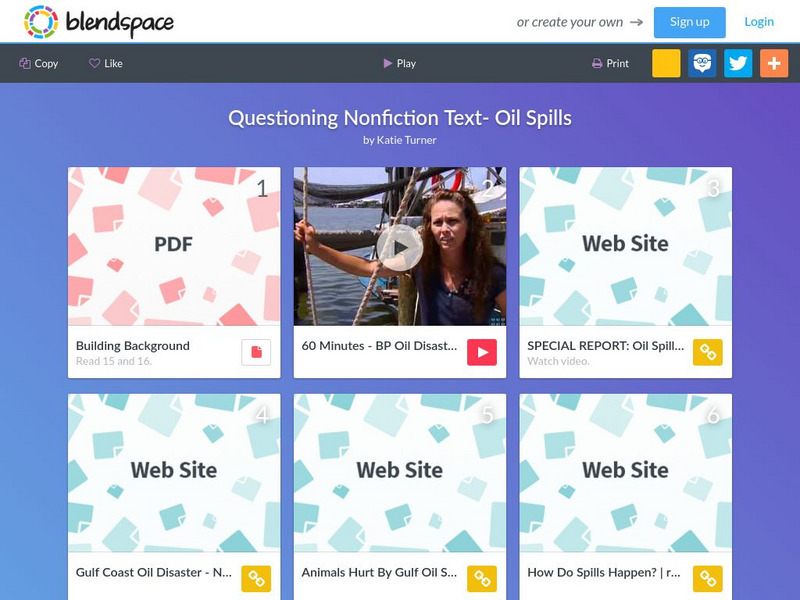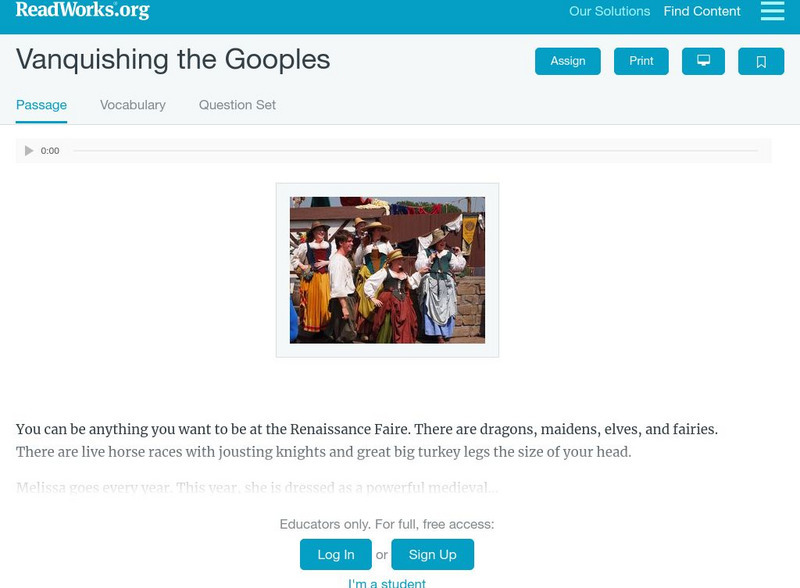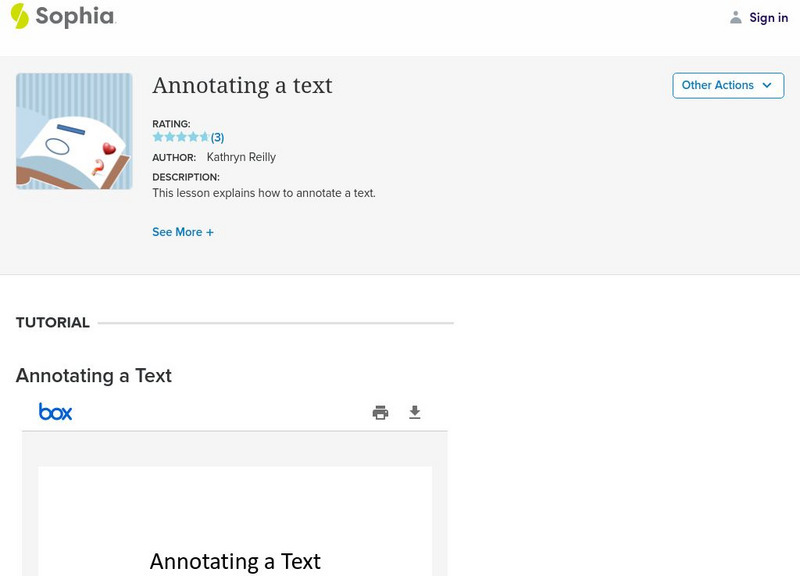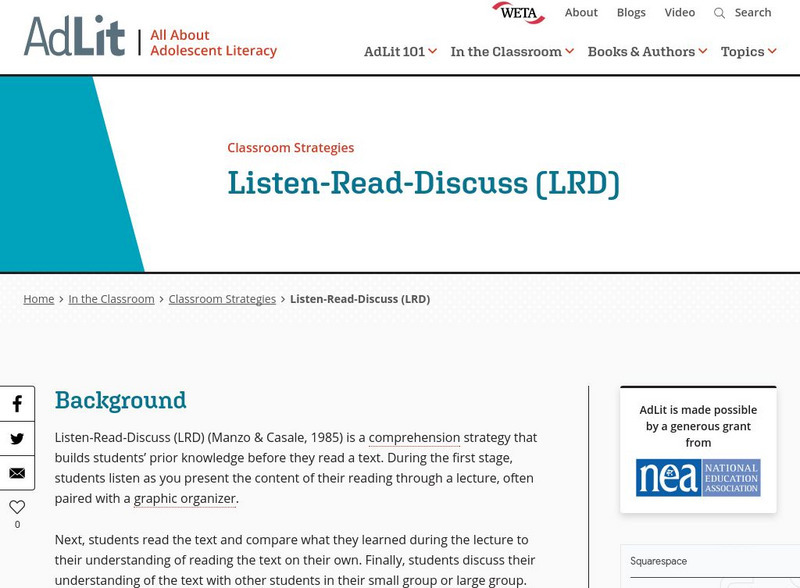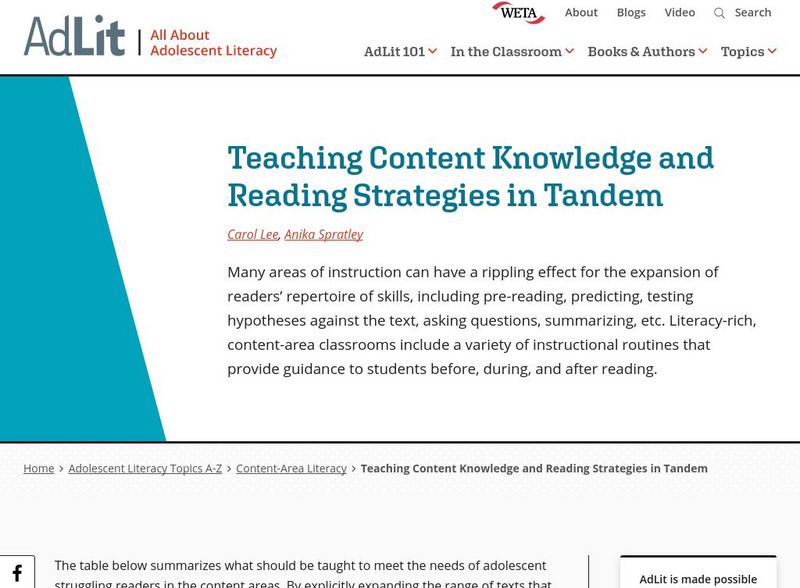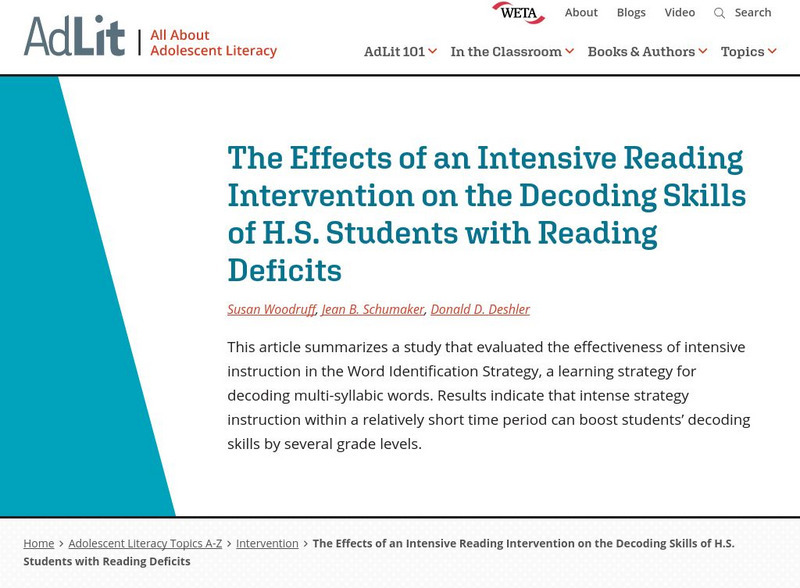ReadWriteThink
Read Write Think: Using Thieves to Preview Nonfiction Texts
Contains plans for three lessons that introduce a nonfiction prereading strategy with the acronym THIEVES, which stands for Title, Headings, Introduction, Every first sentence, Visuals and vocabulary, End Questions, and Summary. In...
TES Global
Blendspace: Questioning Nonfiction Text Oil Spills
An eight-part learning module with links to texts, videos, and websites to use while improving informational text skills through the topic of oil spills. The print materials have directed exercises for text analysis by students.
Read Works
Read Works: Passages: Predicting the Future
[Free Registration/Login Required] Students read an informational text about the predictions of a futurist and answer questions on comprehension, text support, main idea, vocabulary, and more. Links to a paired text and paired text...
Read Works
Read Works: Passages: Vanquishing the Gooples
[Free Registration/Login Required] Students read a story about a girl named Melissa and her adventure at a Renaissance Faire and answer questions in comprehension, setting, characterization, main idea, inference, transitions, and more. A...
Sophia Learning
Sophia: Annotating Text
This slideshow focuses on the reading strategy, annotating text. It defines the term and purpose, lists types of annotation, explains what to annotate, and suggests how readers develop their own method.
Sophia Learning
Sophia: Critical Reading as a Learning Strategy
This tutorial focuses on critical reading using a downloadable PowerPoint presentation, "Critical Reading 101," which includes separating fact from opinion, 6 propaganda techniques, and 6 common fallacies in reasoning. Also provided is...
CommonLit
Common Lit: Financial Literacy
CommonLit.org is a wonderful resource to use in a Language Arts classroom. Each story or article is accompanied by guided reading questions, assessment questions, and discussion questions. In addition, students can click on words to see...
Other
Warren County Schools: Citing Textual Evidence
Well-organized and in-depth lesson on citing textual evidence and understanding inferences. Many examples are included, as well as exercises for the students to practice what they have learned. [PDF]
Better Lesson
Better Lesson: Analyzing Text Complexity of Non Fiction Sources
This lesson plan will help young scholars read and comprehend nonfiction, specifically biographies, through determining criteria for text complexity. Included is a PDF and Smart Notebook titled Determining Text Complexity, and an example...
AdLit
Ad lit.org: Classroom Strategies: Listen Read Discuss (Lrd)
Listen-Read-Discuss (LRD) (Manzo & Casale, 1985) is a comprehension strategy that builds students' prior knowledge before they read a text. During the first stage, students listen as you present the content of their reading through a...
AdLit
Ad lit.org: Classroom Strategies: Inferential Reading
Teaching students to "read influentially" helps them learn how to read more strategically. This technique is derived from the teaching model that learners develop knowledge via the process of interpreting new information in light of past...
AdLit
Ad lit.org: Explicit Comprehension Strategy Instruction
Use explicit strategy instruction to make visible the invisible comprehension strategies that good readers use to understand text. Support students until they can use the strategies independently. Recycle and re-teach strategies...
AdLit
Ad lit.org: Extended Discussion of Text Meaning and Interpretation
Teachers should provide opportunities for students to engage in high-quality discussions of the meaning and interpretation of texts in various content areas as one important way to improve their reading comprehension.
AdLit
Ad lit.org: Teaching Content Knowledge and Reading Strategies in Tandem
Many areas of instruction can have a rippling effect for the expansion of readers' repertoire of skills, including pre-reading, predicting, testing hypotheses against the text, asking questions, summarizing, etc. Literacy-rich,...
AdLit
Ad lit.org: Content Area Literacy: Science
The demands of comprehending scientific text are discipline specific and are best learned by supporting students in learning how to read a wide range of scientific genres. Besides text structures emphasizing cause and effect, sequencing...
AdLit
Ad lit.org: Effects of Intensive Reading Intervention of Decoding Skills
This article summarizes a study that evaluated the effectiveness of intensive instruction in the Word Identification Strategy, a learning strategy for decoding multi-syllabic words. Results indicate that intense strategy instruction...
E Reading Worksheets
E Reading Worksheets: Summarizing Worksheets and Activities
In this instructional resource, students will learn more about summarizing texts. Worksheets and PowerPoint lessons are provided to reinforce understanding about ways to summarize nonfiction texts and to identify main ideas. This module...
Curated OER
Mc Graw Hill: Use Details and Examples
Review how to use text evidence, details, examples, and personal experiences to make inferences then read a passage to practice on your own.
Polk Brothers Foundation Center for Urban Education at DePaul University
De Paul University: Center for Urban Education: I Can Infer Character Traits and Support [Pdf]
Students can use this graphic organizer while making inferences about characters in a story or history text. Students will collect text evidence in the chart to support their character trait inferences.
InterLink Language Centers
Interlink Language Centers: Reading Exercises Science
An interactive exercise for students to use while developing an understanding of how to read scientific informational texts. The text is presented one paragraph at a time and difficult vocabulary words are defined as footnotes. Then...
Other
Kid Bibs: Effective Use of Textbook Features
Here, parents and teachers can find tips for helping young readers understand the expository writing found in textbooks.
ReadWriteThink
Read Write Think: Questioning a Comprehension Strategy for Small Group Reading
Contains plans for three lessons about asking the right questions while reading. After the teacher explains the difference between factual and inferential questions, students practice using them in small-group guided reading. In addition...
Other
English Companion: Reading Expository Text
Taken from "Reading Reminders: Tools, Tips, and Techmiques," the information on this website provides advice on how to read, understand, analyze, and write expository texts.
International Reading Association
Reading Online Articles: Comprehension Instruction
An article on improving reading comprehension through time-tested strategies as well as a summary of new hypotheses about effective comprehension instruction.
